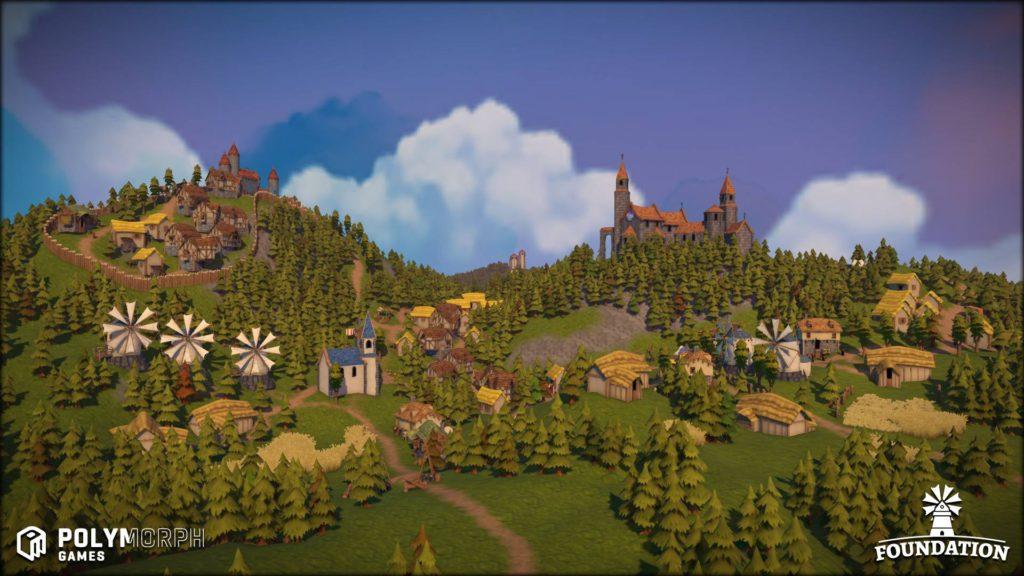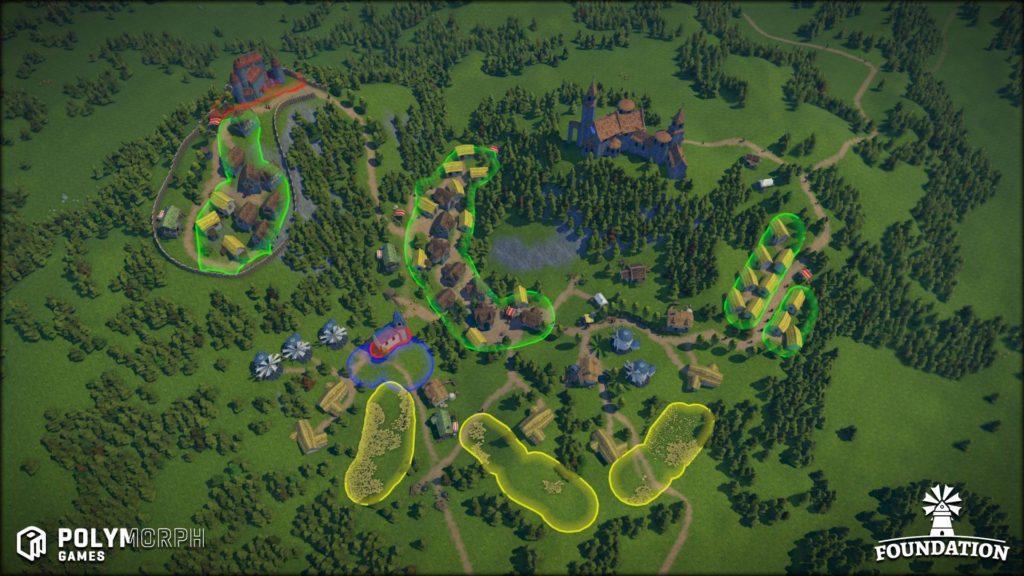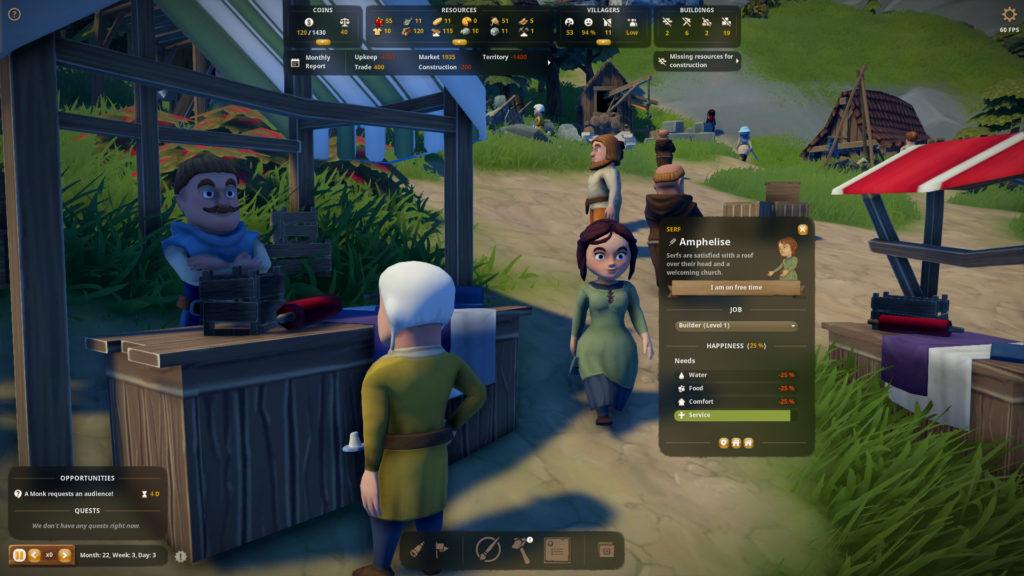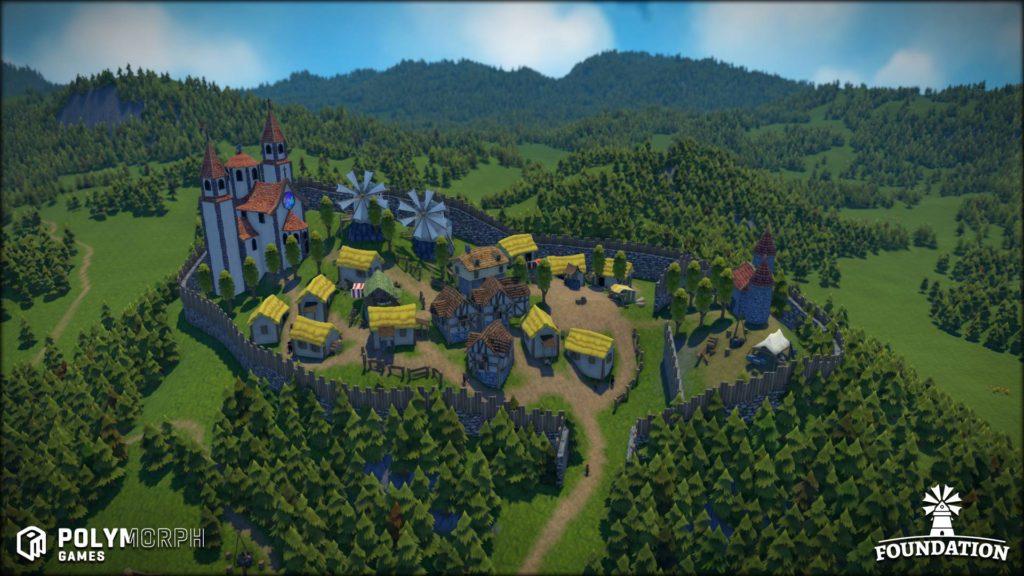
Feb
Foundation – Our interview with developer Polymorph Games
Foundation is a laid back city-building game currently in Early Access. We talked to developer Polymorph Games about the game’s development.
Indie games have been leading the charge on reviving the city builder genre, and Foundation is perhaps the one that offers its players the most freedom in how they build their medieval towns.
It released into Early Access in February 2019, promising laid back gameplay and grid-less building. Over the next three years, it has accrued a thriving community that supports the game not only in development, but also with mods aplenty.
We interviewed Polymorph Games recently on the game’s development journey, the challenges they’ve overcome, and how the game’s future is shaping up. We thank Michaël Bertiaux, the Communications and Social Media Manager at Polymorph Games, for providing these answers.
Tell us about how Polymorph Games was formed and how your first title Foundation was conceived.
Polymorph Games was founded in 2016 by Philippe Dion and Léo Carnaut-Delord. For a long time, both of them had been toying with the idea of creating a unique medieval city builder. Foundation was born from this ambition: to take the genre to new horizons while being true to the chosen era.

Foundation is billed as a grid-less city builder. Tell us about how and why you decided on getting rid of the grid, as well as what challenges that entailed.
Basically, we wanted to go off the beaten path and offer a game experience based on organic urbanism in a medieval setting. By not limiting players to build on grids, we offer them more control over their village, especially its layout.
This also means that every game of Foundation is different: the villages are unique, which adds a little something to the overall experience.
As far as challenges go, the “behind the scenes” management of our game engine is a big one. It must take into account a multitude of player actions and react accordingly in real-time. Since the gameplay doesn’t have that many limits, it is paramount that our algorithms take into account this freedom of action.
One example comes from residential management: houses are built automatically in a pre-painted zone as defined by the player, but the end result isn’t random.

Foundation is inspired by game series like Anno, Settlers, SimCity, and Pharaoh. What aspects are you hoping to recapture from these games?
Each of the aforementioned games brought something special that we unified in Foundation.
Anno puts forward complex production lines as well as villager statuses; Settlers has living, breathing villagers carrying resources around; Pharaoh lets you construct a wide variety of monuments. Combined together, what seems like trivial gameplay elements at a first glance create a rich experience.

Some modern indie city building games have focused on difficult gameplay. Have you considered taking Foundation down this path? Why the emphasis on ‘laid back’ gameplay?
At its core, Foundation is indeed a relaxing experience. This is a conscious choice and is reflected in the soft music that accompanies the game. We feel that there are already a lot of stressful games on the market, so we aimed for a laid back approach.
Foundation invites players to focus their attention on actual village building and creating efficient production lines without the stress that is often synonymous with the city builder genre.
Although from a purely design point of view we encourage a style of play that could be described as relaxed, it is possible to increase the challenge depending on map selection (some have less resources) or by using specific mods.
Our next major update (1.9) will feature new gameplay features that will prove pretty challenging while being completely optional.
Week 5 of our Discord screenshot contest ended with not one, but TWO winners 📷🏆
Congratulations to all who participated!#foundationgame #citybuilder #polymorphgames #indiegame #community pic.twitter.com/0W4qoMmVt6
— Foundation ➡️ V1.8.1 out now! (@foundationgame) February 5, 2022
Foundation lets players build certain free-form buildings from interlocking parts. Has this led to any crazy creations that you’ve seen (or built)?
Our community is bursting with talent! Indeed, the ability to build custom buildings with parts that attach in a variety of ways opens the door to many awesome creations.
If we Include mods in the equation, we’ve had the pleasure of seeing many recreations such as the castles of Neuschwanstein and Berlepsch, a valley from Massachusetts (United States), the Inca citadel of Machu Picchu, Rome’s Colosseum and much, much more.

How do you avoid feature creep and ensure the game doesn’t get too complicated?
We have a clear roadmap and we’re sticking to it. Given the open nature of Foundation, it would be easy to get lost under a ton of features. After all, the possibilities are almost endless!
Our main goal is to fulfill all of our commitments to the community as seen on our Kickstarter crowdfunding campaign. On top of that, we work on punctual patches to ensure a smooth gameplay experience.
The golden rule to avoid an overabundance of features and/or complexity is our desire to leave Early Access sooner rather than later. Every addition, no matter how small, has the potential to break something in Foundation. We strive to create a game with as few problems as possible. Such a focus on quality is a double-edged sword that requires more development time.

Foundation is built on your own, dedicated ‘Hurricane’ game engine. Why build your own engine instead of licensing an existing engine?
One of the main reasons why we created a proprietary engine was to unleash our creativity. Conventional tools often seemed limited for what we wanted to accomplish with Foundation. One of the biggest benefits of creating your own game engine is that you can shape it to the project’s current—and future—needs, thus killing two birds with one stone: foolproofing your technology while eliminating the irritants of products we have worked with in the past.
From a business point of view, Hurricane also improves our studio’s worth: it’s an important tool that offers us a competitive edge; another proof of our know-how.

Foundation has been in Early Access since 2019. How have you incorporated player feedback during this time?
Our team has always maintained a close relationship with the community. Since day one, we have been closely monitoring—and engaging—in discussions surrounding Foundation on a wide variety of online platforms. Players can easily share feedback on our Discord channel where we chat on a daily basis.
In addition to interacting with the community, we take feedback and suggestions to heart. This has definitely helped shape the future of Foundation and continues to do so.
Let's play a game!
Can you spot all the mods? 🔎
Thanks u/creativeDex for the screenshot!#foundationgame #citybuilder #modding #pcgaming #indiegame #polymorphgames pic.twitter.com/jCTifWJC6T
— Foundation ➡️ V1.8.1 out now! (@foundationgame) February 8, 2022
Tell us about what you have in store for the game’s future, including when the game will be released out of Early Access.
At the time of writing, our team is hard at work on Foundation’s 1.9 update. Scheduled later in 2022, it will bring significant changes to the game experience. We’ve done a complete overhaul of the onboarding. In addition, the whole narrative aspect will be much more engaging and detailed than in the past. And this is just a small glimpse of what we have in store for both longtime players and newcomers alike.
As for when we will finally get out of Early Access, that’s the million dollar question! Of course, we would love to be able to announce a release date and not deviate from it. However, the reality of developing a complex video game being what it is, we prefer to stick to approximate dates so as not to disappoint our fans should we hit any bumps along the way.
You can stay updated on the ongoing development of Foundation over here at the official Twitter.
For more game previews and interviews, check out our Previews section on Into Indie Games here!
